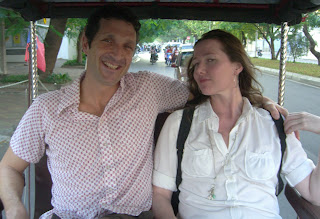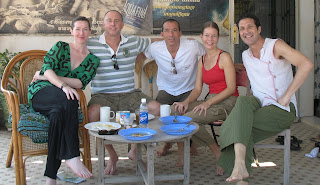 As Tami and I planned our break from the career/life path that we'd been on, we discussed a ton of different reasons why wanted to leave our home in San Francisco. It didn't take long for a short list to develop. I don't know if I've gone back and articulated those objectives but, now that I look back, we've been able to "check" many off the to-do list.
As Tami and I planned our break from the career/life path that we'd been on, we discussed a ton of different reasons why wanted to leave our home in San Francisco. It didn't take long for a short list to develop. I don't know if I've gone back and articulated those objectives but, now that I look back, we've been able to "check" many off the to-do list.We wanted to enjoy some warm weather. Check.
Night market scene near our house
We wanted to get out of a 9-5...or, more accurately...an 8-6 schedule. Instead of clocks and calendars dictating how we used our time, we wanted the rising and setting sun or the seasons to dictate. Check.
We wanted to see if we could let go of some of the stress we were feeling. Check.
We wanted to spend time outdoors. Check.
We wanted to use our bodies i.e. trekking, riding bikes, swimming, etc. Check.
We wanted to share some of our experiences on the road with friends from home. Check.
We wanted to try different foods and cuisines. Check.
I'd traveled outside the US a fair amount before this trip and enjoyed all the above experiences to one degree or another. There was one thing I'd never done before, though, and that goal topped my list. I wanted to live somewhere for awhile - call some foreign city or town or village, "home". As we prepare to depart Southeast Asia, I am happy to say that we have been able to enjoy a brief version of that experience now, as well.
 Neon sign for the market where we shopped in Phnom Penh.
Neon sign for the market where we shopped in Phnom Penh.Our goal in "living" someplace, meant that we wanted to get to know it better than you would if you were just passing through. We wanted to work. Originally, we had hopes of opening a restaurant or some other business. For a variety of reasons, we got cold feet on that one. The next logical step was to try to contribute something helpful to the place where we settled. On that note, we got extremely lucky with our positions with Kiva and Maxima. Not only did we find work, but the work was fascinating and the people we worked with were so gracious and professional that I'll do well to try to match their examples. I feel very fortunate that I leave Cambodia calling many of them friends.
 Some of the Maxima staff at the wedding of one of their colleagues.
Some of the Maxima staff at the wedding of one of their colleagues. Wedding procession at the same wedding.
Wedding procession at the same wedding.We wanted to live someplace other than a hotel. In this case, we were also very lucky. We looked at several places but fell in love with a third-floor flat in a family's house. We had a big, tiled terrace in front, a great roof deck...and the thing we wanted most - a kitchen. Tami and I will be working off the extra pounds for a few months. :)
 Thanksgiving crew on our roof at sundown.
Thanksgiving crew on our roof at sundown.
We hoped get to know people - locals and/or expatriates. Cambodia is a great place for both. I sound like a broken record going on about how nice the Cambodians are but that's the reality. Come and check it out for yourself. Lots of interesting non-Cambodians have settled there, as well. One nice ending story is that, Bari (second from right in the above photo) took over our apartment. We had some very good times with him and were super-happy to pass on such a groovy pad to someone we knew. Funny footnote: Bari's originally a Michigander and was one of the founders of a vegetarian restaurant I worked at in Ann Arbor back in the late '80's. Now he's making a home in Phnom Penh working with local folks out on Koh Dach, a nearby island in the Mekong River.
So, now we move on - sad to go but very happy we had this opportunity. If you're curious at all if you can do it, have no fear. It's a great experience. Somehow I don't think this is our last time, either.
 Fruit shake vendor at the night market near Orussey
Fruit shake vendor at the night market near Orussey























 Two more friends from home just rolled through for a visit...and what a treat it was. As fun as our time out here on the road has been, very little can beat catching up with friends over a long brunch or dinner. Every time someone visits, it feels like a personal envoy from our homeland has set aside time for classified debriefing.
Two more friends from home just rolled through for a visit...and what a treat it was. As fun as our time out here on the road has been, very little can beat catching up with friends over a long brunch or dinner. Every time someone visits, it feels like a personal envoy from our homeland has set aside time for classified debriefing. 









